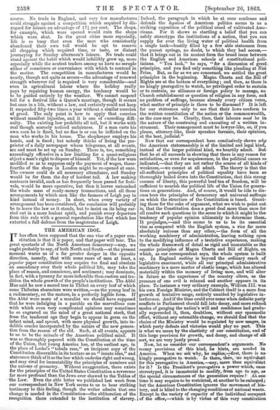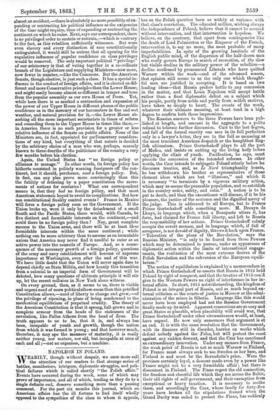THE AMERICAN IDOL.
IT has often been supposed that the one vice of a paper con- stitution is that it is paper, and that paper will tear. The great spectacle of the North American democracy—nay, we ought probably to say, of both North and South—at the present moment warns us of a far greater danger in the opposite direction, namely, that with some races of men at least, a popular paper constitution may acquire too final and absolute an ascendancy over their whole political life, may take the place of reason, and conscience, and sentiment; may dominate, in fact, with a tyranny far more inflexible than custom and tra- dition the whole growth of the people's institutions. The Abbe Hue said he saw a sacred tree in Thibet on every leaf of which some Thibetan characters were written,—on the young leaf in a rudimentary, on the mature, in a perfectly legible form. If the Abbe were more of a moralist we should have supposed that he were indulging in a parable on the marvellous ease with which even very complicated opinions may sometimes be so engraved on the mind of a great national stock, that from the tenderest age they begin to appear in germ on the infant mind, and sprout, with mere physical growth, into in- delible oracles incorporated by the nature of the new genera- tion from the reason of the old. Such, at all events, appears to us to be the miracle of the American political mind. It was so thoroughly papered with the Constitution at the time of the Union, that young America has, at the earliest age, in tho place of Locke's " tabula rasa," an incipient copy of the Constitution discernible in its texture as an " innate idea," and statesmen think of it as the law which underlies right and wrong, and may rival for immutability the principles of numbers and the axioms of geometry. Without exaggeration, there exists for the principles of the United States Constitution a reverence far more profound than the Jews ever showed to the Tables of the Law. Even the able letter we published last week from our correspondent in New York seems to us to bear striking testimony to this feeling, though the writer admits that one change is needed in the Constitution—the obliteration of the recognition there extended to the institution of slavery. Indeed, the paragraph in which he at once confesses and defends the legalism of American politics seems to us a striking exposition of the political creed of cultivated Ame- ricans. For it shows so startling a belief that you can safely stereotype the institutions of a nation, that you can supply for ever the living water of political health from a single tank—hastily filled by a few able statesmen from the purest springs, no doubt, to which they had access,— that it brings out in its neatest form the broad issue between the English and American schools of constitutional poli- ticians. " You look," he says, "for a discussion of great-, principles, and you find only something like pleading at Nisi Prius. But, as far as we are concerned, we settled the great principles in the beginning. Magna Charts and the Bill of Rights are at the bottom of everything; and then, as there is no kingly prerogative to watch, no privileged order to sustain or to restrain, no alliances or foreign policy to manage, no Church establishment or question of religion in any form, and no problem of suffrage, because already every citizen votes, what matter of principle is there to be discussed ? It is left. for our statesmen only to see that their laws conform to. the written constitution of the nation or the commonwealth, ' as the case may be. Clearly, then, their labours must be in the nature of the construing and executing of a written in- strument. Their management must be lawyer-like, or, if yon please, attorney-like, their speeches forensic, their opinions, at the best, judicial."
Now that our correspondent here conclusively shows why the American statesmanship is of the limited and legal kind, instead of the larger political kind, we heartily admit. But. that he at all succeeds in showing that there is any reason for satisfaction, or even for acquiescence, in the political causes so. indicated,—that they are not rather the source of all kinds of weakness,—we cannot at all admit. The theory is that the all-sufficient principles of political equality have been so- thoroughly boiled down into the Constitution, that this strong: essence of liberty, this powerful beef-tea of freedom, will be sufficient to nourish the political life of the Union for genera- tions on generations. And, of course, it would be idle to dis- cuss here the principles of democracy and universal suffrage on which the structure of the Constitution is based. Grant- ing these for the sake of argument, what we wish to point out.
is, that the Constitution does a great deal more than once for resolve such questions in the sense in which it might be the tendency of popular opinion ultimately to determine them.
It prejudges,—and this seems to us to be its essential vice as compared with the English system, a Tice far more absolutely ruinous than any other,—the form of all the- working machinery of administration, leaving nothing open to the modifying influence of a tentative experience, making the whole framework of detail as rigid and immutable as the negative principles of Magna Charta and Bill of Rights, on which, as our correspondent says, the whole system is built up. In England noting is beyond the ordinary reach of legislative enactment, while all our principal administrative machinery is a mere matter of elastic usage, which has altered materially within the memory of living men, and will alter in future as the experience of the country alters, as the pressure of one evil is relaxed and another appears in its place. To instance a very ordinary example, William III. was• his own Foreign Minister, and the Cabinet itself is a mere free- growth of tentative usage, entirely unaided by legislative in- terference. And if the time could ever come when definite party conflicts in Parliament should fall into decay, and more refined.
modes of ganging the nation's will and confidence had gradu- ally superseded it, then, doubtless, without any spasmodic effort, without any ostensible change, we should find that the choice of the Ministry would be regulated by new usages, in which party defeats and victories would play no part. This is what we mean by the elasticity of our constitution, and of this large provision for growth, and decay, and change of all sort, we are very justly proud. Now, let us consider our correspondent's arguments. No. roomy provisions of this kind, he hints, are needed in America. When we ask why, he replies,-:-first, there is no- kingly prerogative to watch. Is there, then, no equivalent for this prerogative in America,—nay, more than equivalent for it ? Is the President's prerogative a power which, once stereotyped, it is immaterial to modify, from age to age, as the special circumstances of the generation require ? At one- time it may require to be restricted, at another to be enlarged; but the American Constitution ignores the movement of his- tory, and is blind to the changing conditions of national wants. Except in the variety of capacity of the individual occupant of the office,—which is by virtue of this very constitution almost an accident, —there is absolutely no morepossibi/ity of ex- panding or contracting his political influence as the exigencies of the time might require, than of expanding or contracting the continent on which he rules. Next, says our correspondent, there is no privileged order to sustain or restrain,—which is contrary to the fact, as this rebellion sufficiently witnesses. But were even slavery and every distinction of race constitutionally extinguished, it would still be untrue that all opening for the regulative influence of popular confidence on class privileges would be removed. The only important political " privilege" of our aristocracy is that of voting together in a co-ordinate branch of the Legislature and supplying Ministers—now more, now fewer in number,—like the Commons. But the American Senate, though elective, is just such a class. It has a special in- fluence in the conduct of foreign affairs, and it is elected on dif- ferent and more Conservative principles than the Lower House; and might easily become almost as different in temper and tone from the popular assembly as our own House of Peers. Yet, while here there is as marked a contraction and expansion of the power of our Upper House in different phases of the public confidence as in the mercury of our barometers in fine and wet weather, and natural provision for it,—the Lower House ab- sorbing all the more important secretariats in times of reform and conceding them to the Upper House in times like these,— in America there is no such provision for a greater or less relative influence of the Senate on public affairs. None of the Ministers are, in fact, appointed for parliamentary considera- tions of any kind, but everything of that nature is decided by the arbitrary choice of a man who was, perhaps, scarcely known to three-fourths of the politicians of the country a very few months before his election.
Again, the United States has " no foreign policy or alliances to manage." In other words, its foreign policy has hitherto consisted in politely warning foreigners off the con- tinent, lest it should, perchance, need a foreign policy. But, in fact, can any plea prove more convincingly than this the futility of fettering by a paper constitution the move- ments of nations for centuries ? What our correspondent means is, that they had no foreign policy, and that most American statesmen hoped to avoid its complications. But how can constitutional finality control events ? France in Mexico will force a foreign policy soon on the Government. If the Union broke up, were it only by the detachment of a small South and the Pacific States, there would, with Canada, be five distinct and formidable interests on the continent,—and could there be no foreign policy then ? Nay, grant complete success to the Union arms, and there will be at least three formidable interests within the same continent ; while nothing can be more arbitrary than to assume as an immutable axiom that America may never find it needful to enter as an active power into the councils of Europe. And, as a conse- quence of the necessary growth of a foreign policy, questions of the army and navy establishment will become of supreme importance at Washington, even after the end of this war. We have little doubt that the Union will never again dare to depend chiefly on State Militia, and how keenly this transition from a colonial to an imperial form of Government will be debated, how many questions of ultimate principle it will stir up, let the recent collision in New York alone witness.
On every ground, then, as it seems to us, there is visible and urgent need of more politicalelbow-room than this petrified Constitution allows,—need of liberty to change and grow,—of the privilege of ripening, in place of being condemned to the mechanical equilibrium of perpetual crudity. The theory of the American Constitution is that it sprang, full-grown and in complete armour from the heads of the statesmen of the revolution, like Pallas Athene from the head of Zeus. The truth appeari to us to be, that it is, and always has been, incapable of youth and growth, though the nation from which it was formed is young; and that however much, therefore, it may ape the manners of maturity, it is really neither young, nor mature, nor old, but incapable at once of each and all ;—not an organism, but a machine.































 Previous page
Previous page